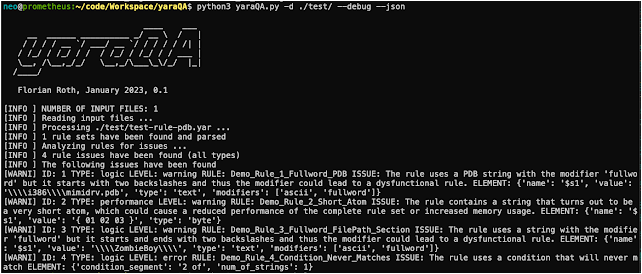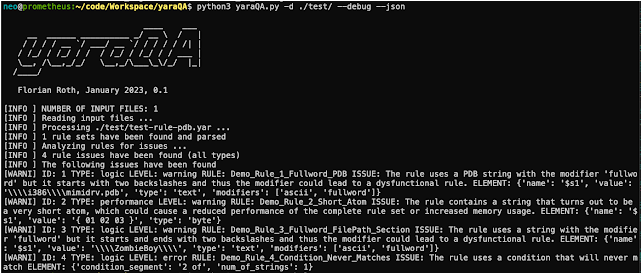yaraQA – YARA Rule Analyzer To Improve Rule Quality And Performance
YARA rule Analyzer to improve rule quality and performance
Why?
YARA rules can be syntactically correct but still dysfunctional. yaraQA tries to find and report these issues to the author or maintainer of a YARA rule set.
The issues yaraQA tries to detect are e.g.:
- rules that are syntactically correct but never match due to errors in the condition (e.g. rule with one string and
2 of themin the condition) - rules that use string and modifier combinations that are probably wrong (e.g.
$ = "\\Debug\\" fullword) - performance issues caused by short atoms, repeating characters or loops (e.g.
$ = "AA"; can be excluded from the analysis using--ignore-performance)
I’m going to extend the test set over time. Each minor version will include new features or new tests.
Install requirements
pip install -r requirements.txtUsage
usage: yaraQA.py [-h] [-f yara files [yara files ...]] [-d yara files [yara files ...]] [-o outfile] [-b baseline] [-l level]
[--ignore-performance] [--debug]
YARA RULE ANALYZER
optional arguments:
-h, --help show this help message and exit
-f yara files [yara files ...]
Path to input files (one or more YARA rules, separated by space)
-d yara files [yara files ...]
Path to input directory (YARA rules folders, separated by space)
-o outfile Output file that lists the issues (JSON, default: 'yaraQA-issues.json')
-b baseline Use a issues baseline (issues found and reviewed before) to filter issues
-l level Minium level to show (1=informational, 2=warning, 3=critical)
--ignore-performance Suppress performance-related rule issues
--debug Debug outputTry it out
python3 yaraQA.py -d ./test/Suppress all performance issues and only show detection / logic issues.
python3 yaraQA.py -d ./test/ --ignore-performanceSuppress all issues of informational character
python3 yaraQA.py -d ./test/ -level 2Use a baseline to only see new issues (not the ones that you’ve already reviewed). The baseline file is an old JSON output of a reviewed state.
python3 yaraQA.py -d ./test/ -b yaraQA-reviewed-issues.jsonExample Rules with Issues
Example rules with issues can be found in the ./test folder.
Output
yaraQA writes the detected issues to a file named yaraQA-issues.json by default.
This listing shows an example of the output generated by yaraQA in JSON format:
[
{
"rule": "Demo_Rule_1_Fullword_PDB",
"id": "SM1",
"issue": "The rule uses a PDB string with the modifier 'wide'. PDB strings are always included as ASCII strings. The 'wide' keyword is unneeded.",
"element": {
"name": "$s1",
"value": "\\\\i386\\\\mimidrv.pdb",
"type": "text",
"modifiers": [
"ascii",
"wide",
"fullword"
]
},
"level": "info",
"type": "logic",
"recommendation": "Remove the 'wide' modifier"
},
{
"rule": "Demo_Rule_1_Fullword_PDB",
"id": "SM2",
"issue": "The rule uses a PDB string with the modifier 'fullword' but it starts with two backslashes and thus the modifier could lead to a dysfunctional rule.",
"element": {
"name": " $s1",
"value": "\\\\i386\\\\mimidrv.pdb",
"type": "text",
"modifiers": [
"ascii",
"wide",
"fullword"
]
},
"level": "warning",
"type": "logic",
"recommendation": "Remove the 'fullword' modifier"
},
{
"rule": "Demo_Rule_2_Short_Atom",
"id": "PA2",
"issue": "The rule contains a string that turns out to be a very short atom, which could cause a reduced performance of the complete rule set or increased memory usage.",
"element": {
"name": "$s1",
"value": "{ 01 02 03 }",
"type": "byte"
},
"level": "warning",
"type": "performance",
"recommendation": "Try to avoid using such short atoms, by e.g. adding a few more bytes to the beginning or the end (e.g. add a binary 0 in front or a space after the string). Every additional byte helps."
},
{
"rule": "Demo_Rule_3_Fullword_FilePath_Section",
"id": "SM3",
"issue": "The rule uses a string with the modifier 'fullword' but it starts and ends with two backslashes and thus the modifier could lead to a dysfunctional rule.",
"element": {
"name": "$s1",
"value": "\\\\ZombieBoy\\\\",
"type": "text",
"modifiers": [
"ascii",
"fullword"
]
},
"level": "warning",
"type": "logic",
"recommendation": "Remove the 'fullword' modifier"
},
{
"rule": "Demo_Rule_4_Condition_Never_Matches",
"id": "CE1",
"issue": "The rule uses a condition that will never match",
"element": {
"condition_segment": "2 of",
"num_of_strings": 1
},
"level": "error",
"type": "logic",
"recommendation": "Fix the condition"
},
{
"rule": "Demo_Rule_5_Condition_Short_String_At_Pos",
"id": "PA1",
"issue": "This rule looks for a short string at a particular position. A short string represents a short atom and could be rewritten to an expression using uint(x) at position.",
"element": {
"condition_segment": "$mz at 0",
"string": "$mz",
"value": "MZ"
},
"level": "warning",
"type": "performance",
"recommendation": ""
},
{
"rule": "Demo_Rule_5_Condition_Short_String_At_Pos",
"id": "PA2",
"issue": "The rule contains a string that turns out to be a very short atom, which could cause a reduced performance of the complete rule set or increased memory usage.",< br/> "element": {
"name": "$mz",
"value": "MZ",
"type": "text",
"modifiers": [
"ascii"
]
},
"level": "warning",
"type": "performance",
"recommendation": "Try to avoid using such short atoms, by e.g. adding a few more bytes to the beginning or the end (e.g. add a binary 0 in front or a space after the string). Every additional byte helps."
},
{
"rule": "Demo_Rule_6_Condition_Short_Byte_At_Pos",
"id": "PA1",
"issue": "This rule looks for a short string at a particular position. A short string represents a short atom and could be rewritten to an expression using uint(x) at position.",
"element": {
"condition_segment": "$mz at 0",
"string": "$mz",
"value": "{ 4d 5a }"
},
"level": "warning",
"type": "performance",
"recommendation": ""
},
{
"rule": "Demo_Rule_6_Condition_Short_Byte_At_Pos",
"id": "PA2",
"issue": "The rule contains a string that turns out to be a very short atom, which could cause a reduced performance of the complete rule set or increased memory usage.",
"element": {
"name": "$mz",
"value": "{ 4d 5a }",
"type": "byte"
},
"level": "warning",
"type": "performance",
"recommendation": "Try to avoid using such short atoms, by e.g. adding a few more bytes to the beginning or the end (e.g. add a binary 0 in front or a space after the string). Every additional byte helps."
},
{
"rule": "Demo_Rule_6_Condition_Short_Byte_At_Pos",
"id": "SM3",
"issue": "The rule uses a string with the modifier 'fullword' but it starts and ends with two backsla shes and thus the modifier could lead to a dysfunctional rule.",
"element": {
"name": "$s1",
"value": "\\\\Section\\\\in\\\\Path\\\\",
"type": "text",
"modifiers": [
"ascii",
"fullword"
]
},
"level": "warning",
"type": "logic",
"recommendation": "Remove the 'fullword' modifier"
}
]Screenshots
A considerable amount of time and effort goes into maintaining this website, creating backend automation and creating new features and content for you to make actionable intelligence decisions. Everyone that supports the site helps enable new functionality.
If you like the site, please support us on “Patreon” or “Buy Me A Coffee” using the buttons below
To keep up to date follow us on the below channels.




